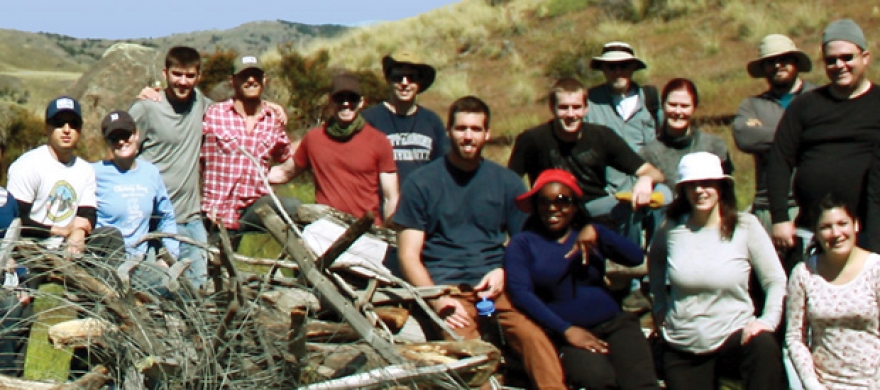At Lands End
Graziadio School students experience environmentally sustainable business practice on location in Patagonia, Chile.
At the far tip of South America lies Patagonia, Chile, a region known for its pristine natural beauty and breathtaking landscape. With less than five percent of Patagonia permanently conserved, it is also one of the world’s most vulnerable spaces, in need of immediate and sustainable preservation support.
A group of 20 Pepperdine students joined the cause this winter when they traveled to the site of the future Patagonia National Park as part of a global business program at the Graziadio School of Business and Management.
Students and faculty embarked on the cross-country trip, designed to develop skills in environmentally sustainable business practice, in collaboration with Patagonia, Inc., an eco-friendly apparel company, and Conservación Patagonica, a nonprofit charity protecting the roughly 450,000 acres of wild land in Patagonia.
The experience focused on both environmental entrepreneurship and stewardship, combining case studies, discussions, and lectures, with fieldwork in sustainability. Faculty leaders Tetsuya O’Hara (MBA ’08) and Graziadio School associate dean David Smith mobilized the excursion, which was available to second-year full-time MBA students in the Environmental EntrepreneurshipDevelopment course as part of the new Certificate in Socially, Environmentally, and Ethically Responsible (SEER) Business Practice program.
Mornings consisted of team projects to analyze the environmentally responsible business practices of such companies as Patagonia, Toyota, Walmart, and others, helping the students develop a deeper conceptual and philosophical understanding of environmental entrepreneurship. Then, during the majority of daylight hours, students did the physically demanding work of removing invasive elements from the park such as barbed wire fences.
Current MBA student Robert Bikel was struck by the dual nature of the experience. “Our morning lectures discussed the role of sustainability and business at the 50,000-foot level, and our afternoons were spent literally at the ground level pulling up fence posts and weeding plants, all in this amazing environment. Studying and working in this rarified atmosphere led to unusually high-level discussions,” he says. “It was an extraordinary opportunity.”
Smith explains that tearing down fences and weeding nonnative plants with pickaxes along the Chilean hillside was a necessary experience in challenging the students’ thinking. “Taking students out into a very remote environment really added to a heightened awareness of globally responsible business practices,” he explains. “Some students had lodge accommodations, but many of us were sleeping in tents and living in a very rustic environment.”
It was just the experience that Bikel was seeking during his graduate education. “It seemed like the ideal opportunity to leverage what I had been learning about sustainability, as well as to gain international experience and perspective,” he says. “This was so squarely in the center of my mission of working toward something that would benefit both people and the planet.”
In addition to familiarizing the students with Patagonia’s vulnerable topography, the excursion engaged students in a dialogue with leaders on the cutting edge of conservation and socially responsible business practice. This came by way of Conservación Patagonica founders Kris Tompkins (a former CEO of Patagonia, Inc.) and Doug Tompkins (cofounder of both ESPRIT and The North Face).
Over the course of the trip, Bikel felt particularly inspired by Doug and his views on enhancing biodiversity through local, sustainable efforts. “Doug really challenged our thinking in terms of the place that eco-justice plays in a business environment,” says Bikel. “Business students spend so much time figuring out the corporate system, that nobody ever takes a step back to ask, ‘Does it have to be set up this way? Are there better ways to make things work for the planet and people?’”
The experience also got both the students and faculty thinking concretely about their
future and the decisions that they make. “Sustainability is not just a story about
being green,” explains Smith. “It’s a story about taking care of the earth’s inhabitants
while being cognizant of the impact you’re having on the earth.”
Read more about the program »
